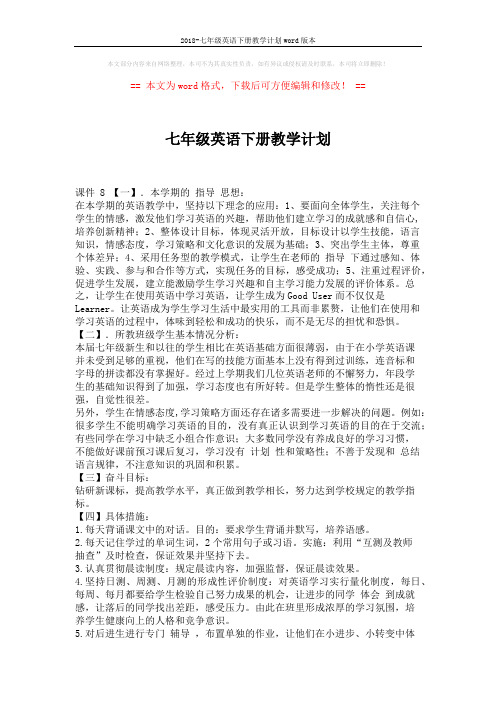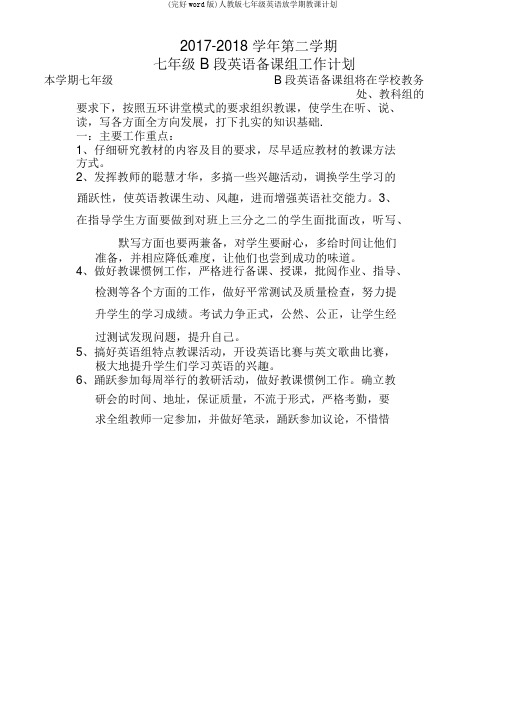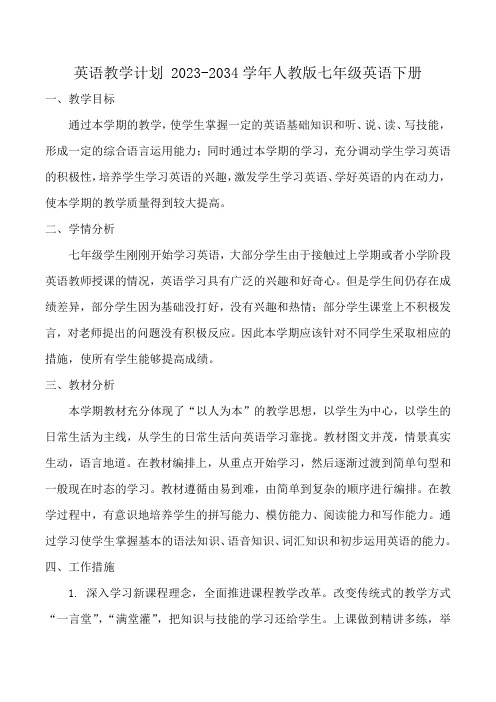(完整word版)2018年春人教版七年级英语下册教学计划
2024年春学期人教版初中英语七年级下册教学计划附教学进度表

2024年春学期人教版英语七年级下册教学计划附教学进度表一、学情分析本学期我担任本班英语学科教学工作。
本学期本班共有X名学生,其中男生X名,女生X名。
学生学情相对平衡。
大多数学生基础较为扎实,对英语课的认识和理解也逐渐深入,能大胆尝试和探究问题。
部分学生基础比较薄弱,阅读理解能力、文字组织和表达能力、写作能力等不强,短时期难以有较大的提高。
本学期要注重提高全体学生的英语素养。
采取“分层式”教学方式,培养学生在生活中运用英语的能力,使学生懂得英语对生活的服务关系,发挥语言的交际功能,更好适应社会。
同时,还要培养学生英文文学欣赏的能力。
英语基础知识和能力的训练要更进一步,注重重要语法知识和重点句型的灵活运用和进行英语表达方式的综合训练,并落实到实际运用上。
二、教学内容与教材分析七年级下册共12个单元,加上复习单元2个,文化背景知识和学习策略等局部补充材料。
全书采取任务型语言教学模式,融汇话题、交际功能和语言结构,形成了一套循序渐进的生活化的学习程序。
每个单元都列出明确的语言目标,主要的功能工程与语法结构,需要掌握的根本词汇,并分为A、B两局部。
A局部是根本的语言内容,B局部是知识的扩展和综合的语言运用。
每个单元还有selfcheck局部,供学生自我检测本单元所学的语言知识之用。
它采用“语言的输入——学生的消化吸收——学生的语言输出”为主线编排的。
通过确定languageGoal,采用听、说、读、写,自我检测等手段,有效提高语言习得者的学习效率,有利于习得者的语言产出,表达了以学生为主体的思想。
三、教学目标1、获得英语中的基本理论、概念、原理和规律等方面的学问,明白并关注这些学问在生产、生活和社会中的应用。
2、学会将实践生活中遇到的实际问题转化为英语问题、从而通过英语问题解决实际问题,体验知识的探究及其推理过程并学会在实际问题进行应用。
3、初步具有英语操作的基本技能。
肯定的科学探究和实践才能,养成良好的科学思维习惯。
七年级-人教版-英语-下册-Unit-3-Section-A-(1a-2e)

Pair work
Bob →takes the train Jim →rides his bike John →takes the bus Paul and Yang Lan →walk
A: How does Bob get to school? B: He takes the train. A: How does Jim get to school? B: He rides his bike. A: How does John get to school? B: He takes the bus. A: How do Paul and Yang Lan get to school? B: They walk.
num. num. num. num. num. n. adv. & adj. n. adj. adj.
prep.
六十 七十 八十 九十 一百 分钟 远;远的 (= kilometre)(abbr. km)千米;公里 新的;刚出现的 每一;每个 每天 (表示方式)乘(交通工具) 骑自行车
Free talk
方式状语
1c Look at the picture in 1a. How do the students get to school? Make conversations with your partner.
A: How does Mary get to school? B: She takes the subway.
by bike ride a bike
by taxi take a taxi
on foot walk
Look and discuss
‣ What can you see in the picture? ‣ How many students are there in it? ‣ What are they talking about? ‣ Where are they?
2018-七年级英语下册教学计划word版本 (2页)

2018-七年级英语下册教学计划word版本本文部分内容来自网络整理,本司不为其真实性负责,如有异议或侵权请及时联系,本司将立即删除!== 本文为word格式,下载后可方便编辑和修改! ==七年级英语下册教学计划课件 8 【一】.本学期的指导思想:在本学期的英语教学中,坚持以下理念的应用:1、要面向全体学生,关注每个学生的情感,激发他们学习英语的兴趣,帮助他们建立学习的成就感和自信心,培养创新精神;2、整体设计目标,体现灵活开放,目标设计以学生技能,语言知识,情感态度,学习策略和文化意识的发展为基础;3、突出学生主体,尊重个体差异;4、采用任务型的教学模式,让学生在老师的指导下通过感知、体验、实践、参与和合作等方式,实现任务的目标,感受成功;5、注重过程评价,促进学生发展,建立能激励学生学习兴趣和自主学习能力发展的评价体系。
总之,让学生在使用英语中学习英语,让学生成为Good User而不仅仅是Learner。
让英语成为学生学习生活中最实用的工具而非累赘,让他们在使用和学习英语的过程中,体味到轻松和成功的快乐,而不是无尽的担忧和恐惧。
【二】.所教班级学生基本情况分析:本届七年级新生和以往的学生相比在英语基础方面很薄弱,由于在小学英语课并未受到足够的重视,他们在写的技能方面基本上没有得到过训练,连音标和字母的拼读都没有掌握好。
经过上学期我们几位英语老师的不懈努力,年段学生的基础知识得到了加强,学习态度也有所好转。
但是学生整体的惰性还是很强,自觉性很差。
另外,学生在情感态度,学习策略方面还存在诸多需要进一步解决的问题。
例如:很多学生不能明确学习英语的目的,没有真正认识到学习英语的目的在于交流;有些同学在学习中缺乏小组合作意识;大多数同学没有养成良好的学习习惯,不能做好课前预习课后复习,学习没有计划性和策略性;不善于发现和总结语言规律,不注意知识的巩固和积累。
【三】奋斗目标:钻研新课标,提高教学水平,真正做到教学相长,努力达到学校规定的教学指标。
2017-2018学年最新人教新目标版七年级英语第二学期全册教学设计

2018年春七年级英语下册Unit1-10全册教案Unit 1 Can you play the guitar? (2)Unit 2 What time do you go to school? (11)Unit3 How do you get to school ? (19)Unit4 Don’t eat in class. (25)Unit5 Why do you like pandas? (33)Unit 6 I’m watching TV (43)Unit 7 It’s raining! (55)Unit 8 Is there a post office near here? (65)Unit 9 What does he look like? (74)Unit 10 I’d like some noodles (84)Unit 11 How was your school trip? (91)Unit 12 What did you do last weekend? (103)2018年春七年级英语下册教案Unit 1 Can you play the guitar?一. Knowledge and abilities goals:1.vocabulary:dance,swim,sing,play chess , paint ,speak English, play the guitar2. How to use Model verb‖ can‖.3. Listening and speaking skills and communicative competence.二. Teaching method: Listening and speaking methods. Pair works.三. Moral goals: Encourage students to express their abilities.Content of courses: In this period, students will learn some names of clubs ,such as art , music, chess club, swimming club, etc. students will learn the drills :Do you want to join…club ?Can you …?四. Importance and difficulty: canTeaching Aids: A tape recorder. Some pictures. A projector Some sports things, such as volleyball, basketball, etc. Preparation test paper for lessons before class.五. Teaching Time: 4 periodsPeriod 1 (Section A: 1a-2d)授课人:______ 授课班级: _____ 授课时间:2016年___月___日____午第____节1.Knowledge Objects: Learn to talk about abilities.Know something about the culture of clubs. Can you/he..?What can you do? What club do you want to join?can, can‘t, draw, dance, swim, speak, walk.2.Teaching key point: can3. Teaching Difficult point: can4.Teaching Procedures:Step 1. Lead-inEnjoy a song I’m a musicianT: Do you want to be a musician? S:T: Can you play the piano? S…T: What can you do? S: I can…T: What about you? S:T: OK, now please show your talent and tell us what you can do.Ask one of the students come to the front and do the action. Ask other students to guess what he or she can do.Step 2. PresentationT: Look at the pictures. What are they doing? S:Step 3 Pair workLook at the pictures. Ask and answer like this:A: Can you play basketball?B: Yes, I can. / No, I can‘t.Can you…?Step 4 PresentationShow some pictures of fam ous stars. Practice the third person ―he, she, they‖T: Where can you play chess? S:T: Yes, in a chess club. This term, we have a lot of clubs. What club do you want to join? S…T: Sounds great. Can you…?S: Yes, I can/ No, I can‘tIf the answer is negative, guide students to say:S: No, I can‘t. But I can learn it from others.Step5 Pair workA: What club do you want to join?B: I want to join the…A: Can you …?B: Yes, I can . No, I can‘t. But I can learn it from others.Step 6 ListeningListen to 1bListen to 2a and 2b. Tell them to give special attention to listening activity (names of the clubs). Finish the tasks.Step 7 Pair workLook at 2b and talk about what the people can do the clubs they want to join.Step 7 Role-play the conversation 2dT: If you like telling stories. What club can you join?S: Story telling club.T: Right. Please read the conversation following the recording. Who wants to join the story telling club? Then role-play the conversation.Step 8 Explain some language points.Step 9 HomeworkReflection after class:_____________________________________________________________________ _____________________________________________________________________ _____________________________________________________________________ _________________________________Period 2 (Section A: 3a-3c)授课人:______ 授课班级: _____ 授课时间:2016年___月___日____午第____节1. Knowledge Objects: go on learning to talk about abilities.—Can you play the guitar? —Yes, I can./ No, I can't.—What can you do? —I can dance.—What club do you want to join? —I want to join the chess club.2. Teaching key points: Conclude the usage of ‗can‘; put all new language into practice through different activities.3. Teaching Difficult points: Distinguish ―say, speak, tell, talk‖4.Teaching Procedures:Step1:Greeting, Warming up and duty report.Watch a flash about the content of the Just for fun.Talk something about the flash: Why is the other boy unhappy?Introduce because of the difference of time zones, the time in different places are different.Revision: show the time in six places: Beijing, Tokyo, Paris, Los Angeles, New York, and London. Elicit the sentence pattern: What time is it?It‘s……Draw attention to the ―am‖ and ―pm‖. For instance, Beijing is seven o‘clock in the morning. We can say Beijing is seven am. Los Angeles is three in the afternoon. So we can say Los Angeles is three pm. (teacher helps students answer).Step2:Review the words learnt in the last period and add more.(1)T:Here are some Chinese, let us see what time do they usually get up/ take a shower…get up take a shower eat breakfast go to school eat lunch run go homedo homework eat dinner go to bed(2)ask students to make a surveyAsk your friend 5 questions about his /her day. Then make a report.A: What time do you usually…?B: I usually…at…Step3:presentation.(1)Ben‘s day. Introduce something about Ben.Using the sentence pattern: What time does he usually get up/go to school/…Pay attention to the verb form of the third person.Discuss Do you like ben‘;s routines.(2)Show the picture of Scott. He usually gets up at 5 pm.Ask students to predict what his job is?(3)listen to the tape,and try to answer this question. then read through the passage,and match the pictures with the times.(4)read it again and fill in the chart.(5)answer the following questions1.Where does he work?2.How does he go to work?Step4:Work on 3a.(1)Read through the passage and tell me what his job is.(2)Read it again and match the pictures.(3)Answer questions:What does he do after he get up?Does he go to work after breakfast? What does he do?How does he go to work? By bus or on foot?What does he do before he goes to bed?What does―What a funny time to eat breakfast!‖mean?Step5:Follow up.T:My friend Da Bao likes Scott's work, so he gets to Sai Te Hotel . But he doesn't find him.T: There are many children in the hotel. Look, they are coming. Please ask them questions to find the real Scott.Step6:Work on part4.T:Now six people make a group, and ask the other students when they usually go to bed . The leader lines up from the earliest to the latest bedtime.T: Let's listen Group1…Group2…Step7:Work on part 3 of self –check.T: Now I want to know something about what you do on weekends. You can go, ask your classmates and fill in the forms. Then you have a report.T: You may begin it like this "Ma Li gets up at …"Step8:Homework.Oral work:(1)Read 3a and recite it.(2)Go on making a survey to find out what your classmates do on weekends. Reflection after class:_____________________________________________________________________ _____________________________________________________________________ _____________________________________________________________________ _____________________________Period 3 (Section B: 1a-1f)授课人:______ 授课班级: _____ 授课时间:2016年___月___日____午第____节1. Knowledge Objects: go on learning to talk about abilities. drum, play the drum, piano, play the piano, violin, play the violin2. Teaching key points: Improve listening and speaking3. Teaching Difficult points: Improve listening and speaking4. Teaching Procedures:Step 1 Warming- up and revisionDaily greeting.Check the homework. Let some Ss report what his/her family members can do. Step 2 PresentationPlay the sound of different kinds of instruments. Let Ss guess what it is.Act and show your classmates your talent.T: Please stand in front of your classmates. Act and say what you can.S1: (sing and dance) I can sing and dance.S2: (play the drum) I can play the drum..Step 3 ListeningTell the Ss that they will listen to some sounds of the instruments. Listen and number the words [1-4] in the order of the sounds you hear in 1a.Play the recording again and check the answers.T: Now let's work on 1c. First, let one student read the words and phrases aloud. Then listen to the 1d and circle the words and phrase you hear.Check the answers:T: Now please look at the chart in 1e. What can Bill, Cindy and Frank do? What can't they do? You'll listen to the recording again. Then try to fill in the blanks.Step 4 Group workWork in groups. Take turn to talk about what Bill, Cindy and Frank can and can't do.S1: Bill can play the guitar, but he can't sing.S2: Cindy can sing and play the drum, but he can't play the piano.Teacher can walk around the classroom, and give some help to the Ss.Step 5 HomeworkMake up a conversation between a volunteer and a person who is in charge of a sports club/old people‘s home/music club.Reflection after class:_____________________________________________________________________ _____________________________________________________________________ _____________________________________________________________________ ____________________________________Period 4 (Section B: 2a-self check)授课人:______ 授课班级: _____ 授课时间:2016年___月___日____午第____节1. Knowledge Objects: go on learning to talk about abilities. also, people, help (sb) with sth, center, home, today, be good with, make, make friends, weekend, on weekends/on the weekend, teach, musician2. Teaching key points: Also, too; be good with, help with3. Teaching Dif ficult points: Describe one‘s ability4. Teaching Procedures:Step 1 Warming-upCheck the homeworkAsk some pairs to show their conversationsStep 2 ReadingFirst, show some pictures of the boys and girls and some key words in 2a.T: Here are some pictures and information about Peter, Alan and Ma Huan. Can you describe them according to the pictures and key words?S1: Guide Ss to use ―also, too‖, and distinguish how to use these two words.Give comments on Ss‘ descriptions.T: Now we‘ll read thre e ads. What's the main idea of each ad? What's each ad's title? Now let's read the three ads and select a title for each ad. Ss read carefully and try to select a title for each ad. Check the answers with the class.Step 3 Review the usage of “tell”,Re view and distinguish the usage and function of ―help‖T: Suppose Peter, Alan and Ma Huan want to help to do something after school. Which ad is right for him/her? Now read the descriptions in 2a and the ads in 2b again. Select a right ad for each person.Ss read the descriptions in 2a and the ads in 2b again. Try to select a right ad for each person. They can talk about the answers in their groups.Check the answers with the class.Step 4 Homework1. Recite 2a and 2b2. Finish the exercise on p6Reflection after class:____________________________________________________________________Unit 2 What time do you go to school?1. Teaching Aims:1) Aims of Basic Knowledge:①V ocabulary: time, shower, usually, O‘clock, what time, go to schoo l, take ashower.②Grammar: What time do you…? What time does he / she…?③ Function: Use the simple tense to talk about the daily life.2) Aims of Abilities: Listening skill. Speaking skill. Reading skill. Writing skill.3) Aims of Emotion: Love life.2. Analysis of the Material:1) Brief Introduction of the teaching material:What time / When do you…?‖ ― What time / When does he…?‖2) Teaching Focus: What time do you…? What time does he/ she…?3) Teaching Difficulties: Present tense.3. Learning Methods: Make a plan. Culture.4. Teaching Methods: Student- centered. Task-based Teaching.5. Teaching Time: 4 periodsPeriod 1(Section A: 1a-2a)授课人:______ 授课班级: _____ 授课时间:2016年___月___日____午第____节Step One: Warming-upGreetingT: Good afternoon, everyone.Ss: Good afternoon, Miss Yang.Step Two: Presentation1.Adjust the time, and ask students questions.T: What time is it? Ss: It‘s 12 o‘clock. ( Write on Bb )( Help Ss to say )T: What time is it? Ss: It‘s 10:15.( Help Ss to say )2.Ask one student to come to the front, adjust the time and ask the otherstudents.S1: What time is it? Ss: It‘s 9 o‘clock.3.Teach the new words & phrases.Show some pictures of different clocks and the activities.T: I‘m very busy these days. Can you guess what time I get up / eat breakfast / go to school / run / take a shower? ( Write on Bb)T: I usually get up at 6:35. ( Teach Ss the new word ― usually‖ )S1: You usually eat breakfast at …S2: You usually run at…S3: You usually take a shower at …4.Ask Ss to do the exercise of 1a, and then check the answers.Step Three: Listening1.Show Ss the timetable of Rick‘s ( write on small Bb )Rick‘s timetableGets upEats breakfastRunsGoes to schoolTakes a showerAsk Ss listen to the recorder and fill in the chart.Then check the answers.2.Ask and answer.T: What time does Rick get up / eat breakfast / run / go to school / take a shower ?Ss: He gets up / eats breakfast / runs / goes to school / takes a shower at…( Ask Ss pay attention to the underlined phrases.)Step Four: Consolidation1.Ask Ss to look at the pictures and tell their days.Example: I usually get up at …. I eat breakfast at …. I go to s chool at …. At …, I takea shower.Step Six: Homework1.Try to remember all the words & phrases.2.Survey: Ask your classmates their routines, and give your report.3.Plan: January 1st is coming. Please plan it, and make your day wonderful.Step Seven Blackboard DesignUnit 2What time do you go to school?What time do you go to school? I usually go to school at six thirty.go to school get dressed get up brush teetheat breakfast take a shower what timeReflection after class:_____________________________________________________________________ _____________________________________________________________________ _____________________________________________________________________ _______________________Period 2 (Section A: 2b-Grammar Focus)授课人:______ 授课班级: _____ 授课时间:2016年___月___日____午第____节1. Aims and demands :1) Language skills :Ss learn to talk about kinds of transportation, and how long it takes to go places, and how far apart places are.2) Target Language : Words : how far , get to , bicycle , subway , bus stop, train station , minute, kilometer, mile , transportation , calendarSentences: How do you get to school ? / How long does it take ? / How far is it ? 3) Moral object : Through learning this unit , Ss can enable them to care for each other whenever crossing the roads and pay attention to the sign of traffic.2. Analysis of the material:Students have learned the transportation before.. In this unit ,they need to learn more details about the transportation. At the same time ,they need to learn ―How long and How far‖ and they can use them freely.3. Teaching methods:pairwork , groupwork ,listening and speaking, practicing4, learning strategies:Personalizing Inferring vocabulary5.Teaching aids:Tape recorder, a projector or a computer6.Teaching period:Four periods.Period 3 (Section B: 3a-3c)授课人:______ 授课班级: _____ 授课时间:2016年___月___日____午第____节1. Aims and Demands: Key vocabulary, How do you get to school ? How does he getto school ?2. Teaching methods : Listening Writing Pairwork3. Teaching Aids : A tape recorder.Step I Leading inT: Good morning, everyone! You know I live far away ,so I go to school by bus every day. What about you? David, ―How often do you go to school?‖S:--------T: So we will talk about how to get to places in this unit.Step IINow I will show you pic tures and let‘s review the transportations we know. Then we will learn more about it .(take the subway) Please open your books and finish 1a. Step III1. There are five names in 1b.Now they are in the picture. We should find them.2. Play the tape .They should listen carefully and find the persons .Write the numbers next to the correct students in the picture above. After listening , check the answers together .Step IVPoint to the example in the box , ask two students to read it .then ask them to make up their conversations about how the people in the picture get to school .Teacher choose some pairs to act their conversations.Step VPracticing the listening :T: I will play two conversations The people are talking about how students get to school and how long it takes .The first time check the kinds of transportation that you hear. The second time match the time with the kinds of transportation activity 2a.Step VI1. Pay attention to the picture and dialogue.2. Make your own dialogue into pairs.3. Act it in front of the students.Step VIISummary and homework: This class we have learnt some key vocabulary and the target language .I hope after class you can survey how does your friends get to school .and pre-revise the 3a,3b.Step VIII Blackboard DesignUnit 4 How do you get to school ?How do you get to school ?How long does it take ?It takes about 10 minutes .Reflection after class:_____________________________________________________________________ _____________________________________________________________________ _____________________________________________________________________ __________________________________Period 4授课人:______ 授课班级: _____ 授课时间:2016年___月___日____午第____节课题Unit 2 What time do you go to school?(第4课时)教学批注教学设计一、教学三维目标1.知识与技能:(1)通过本单元的学习,使学生掌握相关的时间表达方法以及相关的词汇,能够就生活中的时间安排及日常活动来交谈;(2)通过情景设计来激发学生学习的学习兴趣,并培养学生的自主学习和与他人合作的精神;(3)通过谈论作息时间及日常活动,培养学生合理安排作息时间的意识。
(完整word版)仁爱版七年级英语下册

gate[ɡeɪt]n.大门by[baɪ]prep.(表示方式,如乘车等);按照adv.经过subway['sʌbweɪ]n.地铁=underground [ˌʌndə'ɡraʊnd] by subway乘地铁always['ɔ:lweɪz]adv.总是,一直come on快点儿;加油;来吧on foot步行plane[pleɪn]n.飞机train[treɪn]n.火车;v.培训,训练ship[ʃɪp]n.(大)船,轮船,舰boat[bəʊt]n.小船,xxweekday[ˈwi:kdeɪ]n.工作日early['ɜ:lɪ]adj.早的;提早的adv.早地;提早bird[bɜ:d]n.鸟catch[kætʃ]v.捉住;接住;染上(疾病)worm[wɜ:m]n.软体虫,蠕虫(尤指蚯蚓)sometimes[ˈsʌmtaɪmz]adv.有时seldom['seldəm]adv.很少walk[wɔ:k]v.& n.步行;散步never['nevə(r)]adv.从不ride[raɪd]v.骑(自行车、马等)park[pɑ:k]n.公园;v.停(汽)watch[wɒtʃ]v.观看;当心;n.手表television[ˈtelɪvɪʒn]n.电视;电视机=TV watch TV看电视soccer[ˈsɒkə(r)](football BrE) n.足球(运动)movie[ˈmu:vi]n.电影filmbegin[bɪ'ɡɪn]v.开始at school在学校;在上课after[ˈmu:viprep.在…后conj.在…以后bed[bed]n.床basketball[ˈbɑ:skɪtbɔ:l]n.篮球swim[swɪm]v.& n.游泳go swimming去游泳listen['lɪsn]v.(注意地)听music['mju:zɪk]n.音乐;乐曲library['laɪbrərɪ]n.图书馆,图书室week[wi:k]n.星期,xxonce[wʌns]adv.一次;曾经conj.一旦twice[twaɪs]adv.两次;两倍great[greɪt]adj.伟大的;好极的wall[greɪt]n.墙the GreatWallxxlife[laɪf]n.生活;生命American[əˈmerɪkən]adj.美国的n.美国人1talk[tɔ:k]nv.&n.谈话Unit 5Topic 2make[meɪk]v.做,制造;使成为card[kɑ:d]n.卡片;xxboring['bɔ:rɪŋ]adj.没趣的,无聊的soon[su:n]adv.很快,马上classroom[ˈklɑ:sru:m]n.教室playground['pleɪɡraʊnd]n.操场lab[læb]n.实验室=laboratorycomputer[kəmˈpju:tə(r)]n.计算机;电脑room[ru:m]n.房间;空间hall[hɔ:l]n.大厅,礼堂dining hall餐厅;食堂gym[dʒɪm]n.体育馆,健身房=gymnasium building[ˈbɪldɪŋ]n.建筑物,楼房swimming[ˈswɪmɪŋ]n.游泳pool[pu:l]n.水池,水塘clean[kli:n]v.使…干净;adj.干净的do some cleaning打扫run[rʌn]v.跑,奔跑dance[dɑ:ns]v.& n.跳舞borrow['bɒrəʊ]v.借,借用workbook[ˈwɜ:kbʊk]n.练习册course[kɔː(r)s]n.过程;课程of course当然use[ju:s]V.用,使用n.用,使用look for寻找shelf[ʃelf](pl.shelves)n.架子keep[ki:p]v.保存;保持must[mʌst]modal v.必须return[rɪ'tɜ:n]v.归还;回来on time准时,按时newspaper[ˈnju:zpeɪpə(r)]n.报纸Lost and Found失物招领处money['mʌnɪ]n.钱wallet[ˈwɑ:lɪt]n.钱包around[ə'raʊnd]adv&rep.到处;围绕few[fju:]adj.很少,不多pron.很少人(或事物、地方)a few一些game[geɪm]n.比赛;运动;游戏sit[sɪt](过去式sat)v.坐ping-pongn.乒乓球运动lesson[ˈlesn]n.课2at the back of在……的后面draw[drɔ:]v.绘画;抽签n.抽签,抽奖picture['pɪktʃə(r)]n.照片;图片;画片because[bɪ'kɒz]conj.因为Japanese[ˌdʒæpə'ni:z]adj.日本的;日本人的;日语的;n.日语;日本人wonderful[ˈwʌndəfl]adj.了不起的;美妙的also['ɔ:lsəʊ]adv.也,而且Unit 5Topic 3Wednesday[ˈwenzdeɪ]n.星期三Monday[ˈmʌndi]n.星期一Tuesday[ˈtju:zdeɪ]n.星期二Thursday[ˈθɜ:zdeɪ]n.星期四Friday[ˈfraɪdeɪ]n.星期五physics[ˈfɪzɪks]n.物理(学)geography[dʒɪ'ɒɡrəfɪ]n.地理(学)P.En.体育.(physical educatin的缩写)art[ɑ:t]n.美术,艺术history[ˈhɪstri]n.历史math[mæθ]n.数学=mathematicsbiology[baɪˈɒlədʒi]n.生物(学)politics[ˈpɒlətɪks]n.政治science['saɪəns]n.科学meeting[ˈmi:tɪŋ]n.会议;会面easy['i:zɪ]adj.容易的interesting[ˈɪntrəstɪŋ]adj.有趣的difficult['dɪfɪkəlt]adj.难的learn[lɜ:n]v.学习,学会which[wɪtʃ]det&pron.哪一个;哪一些subject['sʌbdʒɪkt]n.学科;主题best[best]adv.& adj.最好地(的)(good和well的最高级)study[ˈstʌdi]v.学习;研究n.书房outdoor[ˈaʊtdɔ:(r)]adj.户外的;室外的activity[æk'tɪvətɪ]n.活动attention[əˈtenʃn]n.注意between[bɪˈtwi:n]prep.在(两者)之间;在……中间stamp[stæmp]n.邮票v.跺脚Saturday[ˈsætədeɪ]n.星期六from…to…从…到…night[naɪt]n.夜间sound[saʊnd]n.声音v.听起来好像February[ˈfebr uəri]n.(Feb.)二月hard[hɑ:d]adj.努力的;困难的adv.艰难地;努力地late[leɪt]adv.晚,迟adj.迟(的),晚(的)3bedroom[ˈbedru:m]n.卧室second['sekənd]num.&adv.第二floor[flɔ:(r)]n.楼层;地板and so on等等upstairs[ˌʌpˈsteəz]adv.在(或向)楼上kitchen['kɪtʃɪn]n.厨房dining room[ˈdaɪnɪŋru:m]餐厅living room[ˈliviŋru:m]客厅;起居室bathroom[ˈbɑ:θru:m]n.浴室,洗手间first[fɜ:stnum.&adv.第一lamp[læmp]n.灯clock[klɒk]n.xxnear[nɪə(r)]prep.在…附近adv.在附近aaj.近的under[ˈʌndə(r)]prep在…下面;少于chair[tʃeə(r)]n.椅子behind[bɪˈhaɪnd]prep.(表示位置)在……后面front[frʌnt]n.前面;前部adj.前面的;前部的in front of在……前面guitar[ɡɪˈtɑr]n.xxwindow[ˈwindəu]n.窗户table['teɪbl]n.桌子;表格key[ki:]n.钥匙;关键put[pʊt]v.放away[ə'weɪ]adv.离开put away将……收起door[dɔ:(r)]n.门look after照顾thing[θɪŋ]n.xx;事情center['sentə]n.中心in the center of在……中心yard[jɑ:d]n.院子flower['flaʊə(r)]n.花house[haʊs]n.房子,住宅large[lɑ:dʒ]adj.大的,巨大的left[left]n.左,左边;adv.向左;adj.左边的model['mɒdl]n.模型;模特儿only[ˈəʊnli]adv.仅仅,只有adj.仅有的,唯一的Unit 6Topic2townhouse['taʊnhaʊz]n.排房farmhouse[ˈfɑ:mhaʊs]n.农场住宅country[ˈkʌntri]n.农村,国家apartment[əˈpɑ:tmənt]n.(美)公寓套房rent[rent]v.租借;出租quiet['kwaɪət]adj.安静的4store[stɔ:(r)]n.(大型)百货商店bank[bæŋk]n.银行;岸street[stri:t]n.街道corner['kɔ:nə(r)]n.(街道)拐角;角post[pəʊst]n.邮件;邮政v.邮寄post office[pəustˈɔfis]n.邮局bookstore['bʊkstɔ:(r)]n.(美)书店parking lot[ˈpɑ:kɪŋlɔt]停车场supermarket[ˈsju:pəˌmɑ:kit]n.超市railway[ˈreɪlweɪ]n.铁路station['steɪʃn]n.车站end[end]n.尽头;结尾v.结束road[rəʊd]n.路,道路,公路such as例如community[kə'mju:nətɪ]n.社区child[tʃaɪld](pl.children)n.儿童,小孩a lot of许多,大量(=lots of)sport[spɔ:t]n.体育运动close[kləʊs]adj.接近;亲密的v.关,关闭close to靠近far[fɑ:(r)]adj.远的adv.远far from远离service['sɜ:vɪs]n.服务area['eərɪə]n.地区;面积colorful['kʌləfəl]adj.五彩缤纷的sleep[sli:p]v.&n.睡觉move[mu:v]v.搬(家);移动countryside[ˈkʌntrisaɪd]n.乡村,农村city['sɪtɪ]n.xxnoisy['nɔɪzɪ]adj.吵闹的traffic['træfɪk]n.交通cost[kɒst]n.费用,花费v.需付费miss[mɪs]v.思念;错过air[eə(r)]n.空气;空中fresh[freʃ]adj.xx的Unit 6Topic 3along[əˈlɔŋ]prep.沿着,顺着adv.(与某人)一道,一起turn[tɜ:n]v.转弯;(使)变成n.转弯;轮流crossing[ˈkrɒsɪŋ]n.十字路口meter['mi:tə(r)]n.米,公尺across[tɜ:n]prep.横过;在…对面across from在对面bridge[brɪdʒ]n.桥until[ənˈtɪl]conj. &prep.直到…为止5stop[stɒp]n.车站v.停止;阻止sidewalk[ˈsaɪdwɔ:k]n.(美)人行道public['pʌblɪk]adj.公共的,公众的n.公众;公开light[laɪt]n.灯;灯光adj.明亮的;浅色的;轻的crosswalk[ˈkrɒswɔ:k]n.人行横道danger[ˈdeɪndʒə(r)]n.危险safe[seɪf]adj.安全的hurt[hɜ:t]adj. (身体上)受伤的;v.受伤;感到疼痛lose[lu:z]v.失去;丢失;输掉accident['æksɪdənt]n.事故obey[ə'beɪ]v.服从rule[ruːl]n.规则cross[krɒs]v.穿过sign[saɪn]n.指示牌;符号before[bɪˈfɔ:(r)]conj.在…以前prep.在…以前;在…前面adv.以前both[bəʊθ]pron.两个,两个都third[θɜ:d]num.第三last[lɑ:st]adv.最后;最近det.最近的;最后的v.持续careful['keəfl]adj.小心的ticket['tɪkɪt]n.罚款单;票speed[spi:d]v.超速行驶n.速度wrong[rɒŋ]adj.错误的;有问题的place[pleɪs]n.地点,地方fast[fɑ:st]adv.快,迅速adj.快的,迅速的down[daʊn]prep沿着;向下adv.向下hill[hɪl]n.xx,xxrest[rest]n.休息;其余story[ˈstɔ:ri]n.故事,小说Unit 7Topic 1writer[ˈraɪtɚ]n.作家,作者novel[ˈnɒvl]n.(长篇)小说was[wɒz]v.(am,is的过去式)是born[bɔ:n]v.出生fan[fæn]n.迷;风扇January[ˈdʒænjuəri]n.(Jan.)一月March[mɑ:tʃ]n.(Mar.)三月April['eɪprəl]n.(Apr.)四月May[meɪ]n.五月June[dʒu:n]n.(Jun.)六月July[dʒuˈlaɪ]n.(Jul.)七月August[ˈɔ:gəst]n.(Aug.)八月September[sepˈtembə(r)]n.(Sept.)九月October[ɒkˈtəʊbə(r)]n.(Oct.)十月November[nəʊˈvembə(r)]n.(Nov.)十一月6birthday[ˈbɜ:θdeɪ]n.生日date[deɪt]n.日期;约会calendar[ˈkælɪndə(r)]n.日历plan[plæn]v.&n.计划,打算celebrate['selɪbreɪt]v.庆祝party['pɑ:tɪ]n.聚会,宴会;党派fourth[fɔ:θ, fəʊrθ]num.第四fifth[fɪfθ]num.第五sixth[sɪksθ]num.第六seventh['sevnθ]num.第七eighth[eɪtθ]num.第八ninth[naɪnθ]num.第九tenth[tenθ]num.第十eleventh[ɪ'levnθ]num.第十一twelfth[twelfθ]num.第十二twentieth['twentɪəθ]num.第二十present['preznt]n.礼物shape[ʃeɪp]n.形状v.使成为…形状ball[bɔ:l]n.球;舞会afraid[əˈfreɪd]adj.担心;害怕star[stɑ:(r)]n.星;xxmouse[maʊs]n.老鼠square[skweə(r)]n.正方形;广场;平方adj.正方形的circle['sɜ:kl]n.圈,圆圈v.圈出triangle['traɪæŋɡl]n.三角形rectangle[ˈrektæŋgl]n.长方形;矩形oval['əʊvl]n.椭圆;adj.椭圆形的centimeter['sentɪˌmi:tə]n.(cm)厘米cake[keɪk]n.蛋糕Mrs.[ˈmɪsɪz]n.太太,夫人Unit 7Topic 2piano[piˈænəʊ]n.钢琴else[els]adv.别的,其他的disco['dɪskəʊ]n.迪斯科(一种舞曲)perform[pə'fɔ:m]v.表演ballet['bæleɪ]n.芭蕾舞have a good time玩得高兴smart[smɑ:t]adj.聪明的count[kaʊnt]v.(按顺序)数数ago[eɪdʒ]adv.以前London['lʌndən]n.xxat the age of在……岁时anything[ˈeniθɪŋ]pron.任何事(物);无论何事(物) word[wɜ:d]n.单词7trick[trɪk]n.把戏;诡计enjoy[ɪn'dʒɔɪ]v.享受;欣赏himself[hɪmˈself]pron.他自己enjoy oneself过得愉快kung fun.功夫yesterday['jestədeɪ]adv.在昨天n.昨天ouch[aʊtʃ]interj.(突然受痛时的叫声)哎哟matter[ˈmætə(r)]n.问题fall[fɔ:l](过去式fell)美用v.跌倒;落下n.秋季(autumn BrE) autumn['ɔ:təm]n.秋季poor[pɔ:(r)]adj.可怜的;贫穷的myself[maɪˈself]pron.我自己wash[wɒʃ]v.洗at once立刻,马上washroom[ˈwɒʃru:m]n.洗手间forget[fəˈget]v.忘记bring[brɪŋ]v.带来candle[ˈkændl]n.蜡烛wish[wɪʃ]n.愿望,希望v.希望blow[bləʊ](过去式blew)v.吹;刮风blow out吹灭everyone[ˈevriwʌn]pron.每人,人人sunny['sʌnɪ]adj.阳光充足的delicious[dɪˈlɪʃəs]adj.美味的,可口的musical[ˈmju:zikəl]adj.音乐的everything[ˈevriθɪŋ]pron.一切;每件事minute['mɪnɪt]n.分钟start[stɑ:t]v.开始;出发n.开头Unit 8Topic 1weather['weðə(r)]n.天气spring[sprɪŋ]n.春天warm[wɔ:m]adj.温暖的;热心的season[ˈsi:zn]n.季节summer['sʌmə(r)]n.夏天hot[hɒt]adj.热的;辣的climb[klaɪm]v.爬,攀登winter['wɪntə(r)]n.冬天cold[kəʊld]adj.冷的n.寒冷;感冒rain[reɪn]v.下雨n.雨snow[snəʊ]v.下雪n.雪rainy['reɪnɪ]adj.阴雨的,多雨的remember[klaɪm]v.记得;记起put on穿,戴raincoat[ˈreɪnkəʊt]n.雨衣8foggy['fɒɡɪ]adj.有雾的cloudy['klaʊdɪ]adj.多云的,阴天的bright[braɪt]adj.明亮的temperature[ˈtemprətʃə(r)]n.温度low[ləʊ]adv.低;矮holiday['hɒlədeɪ]n.假期umbrella[ʌmˈbrelə]n.伞sunglasses[ˈsʌnglɑ:sɪz]n.太阳镜shorts[ʃɔ:ts]n.短裤travel[ˈtrævl]v.&n.旅行,旅游wear[weə(r)](过去式wore)v.穿,戴suddenly[ˈsʌdənli]adv.突然shine[ʃaɪn](过去式shone)v.发光,照耀better[ˈbetə(r)]adv.更好had better应该,最好Australia[ɒ'streɪlɪə]n.澳大利亚most[məʊst]det.&pron.大多数adv.最sun[sʌn]n.xx,xxbrightly['braɪtlɪ]adv.明亮地1ater on后来come back to life复苏;复活come out开花;出版,发行heavily[ˈhevɪli]adv.猛烈地harvest['hɑ:vɪst]n.&v.收割,收获busy['bɪzɪ]adj.忙于(做某事),忙(碌)的1eaf(pl.leaves)n.xxwind[wɪnd]n.风strongly[strɒŋlɪ]adv.强烈地ice[aɪs]n.冰hat[aɪs]n.(常指带檐的)帽子Beijing Opera京剧right away立即,马上ourselves[ɑ:ˈselvz]pron.我们自己hope[həʊp]v.&n.希望,期望trip[trɪp]n.旅行,旅游noon[aɪs]n.正午,中午Unit 8Topic 2together[təˈgeðə(r)]adv.一起,共同get together聚会,联欢interest['ɪntrəst]n.兴趣,趣味places of interest名胜Germany['dʒɜ:mənɪ]n.德国India['ɪndɪə]n.xxhometown[ˈhəʊmtaʊn]n.家乡,故乡9tent[tent]n.帐篷prepare[prɪˈpeə(r)]v.准备prepare for为…作准备share[ʃeə(r)]v.分享,共用fun[fʌn]n.乐趣clothing[ˈkləʊðɪŋ]n.衣服carry[ˈkæri]v.携带;拿,提decide[dɪˈsaɪd]v.决定dangerous[ˈdeɪndʒərəs]adj.有危险的stay[steɪ]v.&n.待,停留alone[əˈləʊn]adv.&adj.独自;单独keep away from远离mountain[ˈmaʊntən]n.高山arrive[əˈraɪv]v.到达friendly[ˈfrendli]ad j.友好的gift[gɪft]n.礼物Unit 8Topic 3festival['festɪvl]n.节日Spring Festival春节dumpling[ˈdʌmplɪŋ]n.饺子dragon['dræɡən]n.龙Christmas[ˈkrisməs]n.圣诞节(12月25日)turkey['tɜ:kɪ]n.火鸡(肉)lantern[ˈlæntən]n.灯笼Lantern Festival元宵节lunar['lu:nə(r)]adj.月亮的,月球的sweet[swi:t]adj.甜的luck[lʌk]n.好运,幸运riddle['rɪdl]n.谜语Thanksgiving[ˌθæŋks'ɡɪvɪŋ]n.感恩节pumpkin[ˈpʌmpkɪn]n.南瓜pie[paɪ]n.果馅饼Easter[ˈi:stə(r)]n.复活节believe[bɪ'li:v]v.相信Christ[kraɪst]n.耶稣基督Mid-autumn Festival中秋节mooncake['mu:nkeɪk]n.月饼full[fʊl]adj.满的;充满的moon[mu:n]n.月亮important[ɪmˈpɔ:tnt]adj.重要的decorate['dekəreɪt]v.装饰eve[i:v]n.(尤指宗教节假日的)前夜church[tʃɜ:tʃ]n.教堂10open['əʊpən]v.打开adj.开放的,敞开的Santa Claus[ˈsæntəklɔ:z]n.圣诞老人special[ˈspeʃl]adj.特别的,专门的greet[ɡri:t]v.和(某人)打招呼(或问好)merry['merɪ]adj.愉快的grape[ɡreɪp]n.葡萄Jewish[ˈdʒu:ɪʃ]adj.犹太人的honey['hʌnɪ]n.蜂蜜event[ɪˈvent]n.重要事情,大事stay up熬夜midnight['mɪdnaɪt]n.午夜lucky[ˈlʌki]adj.运气好的,幸运的lucky money压岁钱Halloween[ˌhæləʊˈi:n]n.万圣节前夕scary['skeərɪ]adj.吓人的ghost[ɡəʊst]n.鬼,幽灵knock[nɒk]v.&n.敲knock on敲shout[ʃaʊt]v.&n.呼喊treat[tri:t]n.&v.款待,招待labor['leɪbə(r)]n.劳动International Labor Day国际劳动节Dragon Boat Festival龙舟节(端午节)race[reɪs]n.竞赛,赛跑national['næʃnəl]adj.国家的National Day国庆节the PRC(the People's Republic of China的缩写)中华人民共和国flag[flæɡ]n.旗11。
(完整word版)人教版七年级英语下学期教学计划

2017-2018 学年第二学期七年级 B 段英语备课组工作计划本学期七年级 B 段英语备课组将在学校教务处、教科组的要求下,按照五环讲堂模式的要求组织教课,使学生在听、说、读,写各方面全方向发展,打下扎实的知识基础.一:主要工作重点:1、仔细研究教材的内容及目的要求,尽早适应教材的教课方法方式。
2、发挥教师的聪慧才华,多搞一些兴趣活动,调换学生学习的踊跃性,使英语教课生动、风趣,进而增强英语社交能力。
3、在指导学生方面要做到对班上三分之二的学生面批面改,听写、默写方面也要两兼备,对学生要耐心,多给时间让他们准备,并相应降低难度,让他们也尝到成功的味道。
4、做好教课惯例工作,严格进行备课、授课,批阅作业、指导、检测等各个方面的工作,做好平常测试及质量检查,努力提升学生的学习成绩。
考试力争正式,公然、公正,让学生经过测试发现问题,提升自己。
5、搞好英语组特点教课活动,开设英语比赛与英文歌曲比赛,极大地提升学生们学习英语的兴趣。
6、踊跃参加每周举行的教研活动,做好教课惯例工作。
确立教研会的时间、地址,保证质量,不流于形式,严格考勤,要求全组教师一定参加,并做好笔录,踊跃参加议论,不惜惜自己的可贵经验,虚心听取老师们的指点,保证全组共同提高,共同进步。
7、增强本备课组惯例工作,搞好集体备课。
因为我们组内年青老师许多,因此听、评课很重点、重要,特别是听后的“评”是重中之重。
持续对小组学习模式进行研究,探究并实质运用,,让小组组员可以相互学习,相互帮助,相互提升。
8、联合教科组的课题活动和自己教课实质,撰写教课论文。
积极学习各项课改资料,透辟认识课改信息,争做课改前锋并完全、仔细地贯彻下去。
二:今年级组英语备课计划表以下:周次教课内容第一周Unit1 Can you play the guitar?第二周Unit2 What time do you go to school?第三周Unit3 How do you go to school?第周围Unit4 Don’ t eat in class.第五周Unit 5 Why do you like pandas?(Section A-SectionB1d)第六周Unit5 Section B(2a-self-check)-Unit6 Section A第七周Unit6 I’m watching TV SectionB第八周期中考试第九周第十周第十一周第十二周第十三周第十周围第十五周Unit7 It’s raining.Unit 8 Is there a post office near here?Unit9 What does he look like? SectionA-SectionB1e Unit9 sectionB2a-Unit10 SectionAUnit10 sectionBUnit11 How was your school trip?Unit12 What did you do last weekend?第十六周期末考试总之,我们相信在我们七B 英语组老师们的不停努力下,七年级 B 段的英语教课工作会上一个崭新的台阶,向学校、家庭和社会交上一份满意的答卷。
word完整版人教版初中英语七年级下册Unit3SectionB教材全解

人教版初中英语七年级下册Unit3SectionB教材全解Unit 3 How do you get to school?Unit 3 Section B教材全解1.bus stop 公共汽车站【重点注释】stop,此处用作名词,意为“车站;站点”。
例如:at a/the bus stop 在公共汽车站。
stop一般指的是小站,停车点,如路边的停车站点;station指的是总站,大型的车站,at a bus/train/subway station。
例如:They wait for Jim at the bus stop.他们在公共汽车站等吉姆。
Where si the bus station?公共汽车站在哪儿?例句:Let's stop to have a rest.让我们停下来(原来干的事),(再去)休息一下吧。
Stop talking,please.请停止(正在)说话(这个事)。
They stop to smoke a cigarette.他们停下来(原来干的事),(然后)抽了根烟。
I must stop smoking.我必须戒烟了(我必须停止正在抽烟这个事)。
2.Mary wants to know where Bob lives.玛丽想知道鲍勃住在哪儿。
Mary wants to know what he thinks of the trip.玛丽想知道他(鲍勃)认为这段旅程怎么样。
【重点注释】①Mary wants to know where Bob lives.玛丽想知道鲍勃住在哪儿。
本句含有一个由连接词where引导的宾语从句。
在复合句中用作宾语的从句叫宾语从句。
无论主句是陈述句还是疑问句,宾语从句都必须使用陈述语序,即“主句+连词+宾语从句(主语+谓语+……)”句式。
如果主句的谓语动词是一般现在时,从句的谓语动词可根据需要,选用相应的任何时态。
例如:Please tell me whoknows the answer.请告诉我谁知道答案。
2023-2034学年人教版七年级英语下教学计划

英语教学计划 2023-2034学年人教版七年级英语下册一、教学目标通过本学期的教学,使学生掌握一定的英语基础知识和听、说、读、写技能,形成一定的综合语言运用能力;同时通过本学期的学习,充分调动学生学习英语的积极性,培养学生学习英语的兴趣,激发学生学习英语、学好英语的内在动力,使本学期的教学质量得到较大提高。
二、学情分析七年级学生刚刚开始学习英语,大部分学生由于接触过上学期或者小学阶段英语教师授课的情况,英语学习具有广泛的兴趣和好奇心。
但是学生间仍存在成绩差异,部分学生因为基础没打好,没有兴趣和热情;部分学生课堂上不积极发言,对老师提出的问题没有积极反应。
因此本学期应该针对不同学生采取相应的措施,使所有学生能够提高成绩。
三、教材分析本学期教材充分体现了“以人为本”的教学思想,以学生为中心,以学生的日常生活为主线,从学生的日常生活向英语学习靠拢。
教材图文并茂,情景真实生动,语言地道。
在教材编排上,从重点开始学习,然后逐渐过渡到简单句型和一般现在时态的学习。
教材遵循由易到难,由简单到复杂的顺序进行编排。
在教学过程中,有意识地培养学生的拼写能力、模仿能力、阅读能力和写作能力。
通过学习使学生掌握基本的语法知识、语音知识、词汇知识和初步运用英语的能力。
四、工作措施1. 深入学习新课程理念,全面推进课程教学改革。
改变传统式的教学方式“一言堂”,“满堂灌”,把知识与技能的学习还给学生。
上课做到精讲多练,举一反三,组织好课堂教学。
2. 充分运用多媒体进行教学,让学生对英语产生兴趣。
寓教于乐,激发学生的学习兴趣。
开展一些课外活动如单词竞赛,对话表演等,营造良好的学习氛围。
3. 尽可能地使用英语组织教学,让学生沉浸在英语环境中。
创设各种语境,鼓励学生大胆地使用英语进行交际。
利用好录音机等教学用具进行视、听、说全方位的训练。
4. 抓好早读课和晚自习的朗读与背诵环节,让学生多读多背,提高学生的听说能力。
5. 做好课后的培优补差工作,缩小两极分化。
- 1、下载文档前请自行甄别文档内容的完整性,平台不提供额外的编辑、内容补充、找答案等附加服务。
- 2、"仅部分预览"的文档,不可在线预览部分如存在完整性等问题,可反馈申请退款(可完整预览的文档不适用该条件!)。
- 3、如文档侵犯您的权益,请联系客服反馈,我们会尽快为您处理(人工客服工作时间:9:00-18:30)。
七年级英语教学工作计划
一、教材简析
七年级下册共12个单元,全书采取任务型语言教学模式,融汇话题、交际功能和语言结构,形成了一套循序渐进的生活化的学习程序。
每个单元都列出明确的语言目标,主要的功能项目与语法结构,需要掌握的基本词汇。
每个单元都分为A、B两部分。
A部分是基本的语言内容,B部分是知识的扩展和综合的语言运用。
每个单元还有self check部分,供学生自我检测本单元所学的语言知识之用。
它采用“语言的输入——学生的消化吸收——学生的语言输出”为主线编排的。
通过确定教学目标,采用听、说、读、写,自我检测等手段,有效提高学习效率,体现了以学生为主体的思想。
二、学生学情分析
经过一学期的学习,从上期期末成绩来看,我所担任7(1)班学生总体上对英语基础基础知识掌握较差。
只有少数学生习目的明确,掌握了英语学习的一些基本方法,能够积极主动认真地学习,学习成绩优秀。
而大部分学生对英语感到困难,没有明确的学习目的,缺少学习的热情和主动性,自觉性较差,相应的学习习惯也差。
主要原因是没有激发学生学习英语的兴趣,学生觉得英语学习是一种负担,而不是一种乐趣。
一部分学生没有掌握记忆单词的方法,连基本的单词听写也不过关,导致看不懂,听不懂,学不懂。
学生的听力也还有待提高,在这方面失分也较多。
主要是听的时间太少,接触英语的时间不多。
还有极少部分学生已经放弃学习英语。
三、教学目标
通过本学期教学,能基本达到如下目标:使对英语学习表现出积极性和初步的自信心,能听懂有关熟悉话题的语段和简短的故事,能与教师或同学就熟悉的话题(如学校、家庭生活)交换信息,能读懂小故事及其他文体的简单书面材料,能参照范例或借助图片写出简单的句子,能参与简单的角色扮演等活动,能尝试使用适当的学习方法,学会克服学习中的困难,意识到语言交际中存在文化差异。
四、教学措施
(一)确保基础知识过关,具体方法如下:
1、单词过关:每天记5-8个生词,利用课外时间,由科代表主持,各学习小组长听写、改正。
2、词组过关:把学过的词组归纳,方便学生记忆。
用词组造句和中译英训练。
在各个组内进行竞赛。
3、句型过关:组织学生结对子,一有空就你问我答,营造学习氛围,同时加强笔头的练习,使学生能熟能生巧。
4、课文过关:把课文分段,按学习组为单位,进行朗读比赛,对学过的课文尽量做到人人会背,有些课文还要求学生会默写。
(二)采取科学教学法
1、Daily report:值日生介绍自己、家庭成员或朋友的情况,其它学生可互相提问题,询问个人职业;
2、建立良好的师生关系,协调课堂气氛,培养学生开口说英语的勇气和信心;
3、教师设计好导学案,学生自学讨论。
听说领先,读写跟上。
抓好英语的常规教学,鼓励学生自主探索,合作探究,共同提高。
4、引导学生实现语言的迁移,加强日常生活中英语口语的运用;
5、对后进生进行专门辅导,布置单独的作业,让他们在小进步、小转变中体验学习的快乐,树立学习的自信,尽快成长起来。
五、教学进度安排
第一周:复习、考试
第二周:Unit 1 Can you play the guitar ?
第三周:Unit 2 What time do you go to school ?
第四周:复习Unit 1 Unit 2
第五周:Unit 3 How do you go to school ?
第六周:Unit 4 Don’t eat in class ?
第七周:Unit 5 Why do you like pandas ?
第八周:复习Unit 3 Unit 4 Unit 5
第九周:Unit 6 I’m watching TV.
第十周:五一放假Unit 7 It’s raining !
第十一周:Unit 7 It’s raining !
第十二周:Unit 8 Is there a post office near here ?
第十三周:Unit 9 what does he look like ?
第十四周:复习Unit 8、Unit 9
第十五周:Unit 10 I’d like some noodles .
第十六周:Unit 11 How was your school trip ?
第十七周:Unit 12 What did you do last weekend ? 第十八周:复习、准备期末考试。
